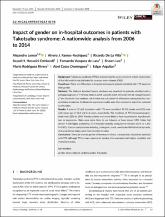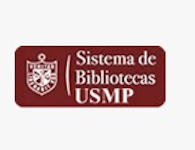Mostrar el registro sencillo del ítem
Impact of gender on in‐hospital outcomes in patients with Takotsubo syndrome: A nationwide analysis from 2006 to 2014
| dc.contributor.author | Lemor, Alejandro | |
| dc.contributor.author | Ramos‐Rodriguez, Alvaro J. | |
| dc.contributor.author | De La Villa, Ricardo | |
| dc.contributor.author | Hosseini Dehkordi, Seyed H. | |
| dc.contributor.author | Vazquez de Lara, Fernando | |
| dc.contributor.author | Lee, Shawn | |
| dc.contributor.author | Rodriguez Rivera, Mario | |
| dc.contributor.author | Casso Dominguez, Abel | |
| dc.contributor.author | Argulian, Edgar | |
| dc.date.accessioned | 2020-06-23T18:33:06Z | |
| dc.date.available | 2020-06-23T18:33:06Z | |
| dc.date.issued | 2019-01-23 | |
| dc.identifier.citation | Lemor A., Ramos AJ., De La Villa R., Hosseini SH., Vazquez F., Lee S., et al. Impact of gender on in-hospital outcomes in patients with Takotsubo syndrome: A nationwide analysis from 2006 to 2014. Clin Cardiol. 2019; 42(1): 13-18. | es_PE |
| dc.identifier.uri | https://hdl.handle.net/20.500.12727/6244 | |
| dc.description.abstract | Background Takotsubo syndrome (TTS) is characterized by acute, transient systolic dysfunction of the left ventricle not attributed to coronary artery disease (CAD). Hypothesis There are differences in hospital outcomes in patients admitted with TTS based on their gender. Methods The National Inpatient Sample database was searched for patients admitted with a principal diagnosis of TTS from 2006 to 2014 using the ICD9‐CM code 429.83. Using Pearson's χ 2 and Student's t test analyses, the P ‐value was calculated for differences among baseline characteristics of patients. Multivariate regression models were then created to adjust for potential confounders. Results A total of 39 662 admissions with TTS were identified, 91.7% female and 8.3% male with mean age of 66.5 and 61.6 years, respectively. The incidence of TTS increased progressively from 2006 to 2014. Female patients were more likely to have hypertension, hypothyroidism, or depression. Males were more likely to use tobacco, or have known CAD. Males had almost 4‐fold higher probability of in‐hospital mortality compared to females (3.7% vs 1.1%; P <0.001). Certain complications including cardiogenic shock, ventricular fibrillation/tachycardia, and acute kidney injury were more common in males. Conclusions There are distinct gender differences in clinical characteristics of patients admitted with TTS. Although TTS is more common in females, it is associated with higher morbidity and mortality in males. | es_PE |
| dc.format.extent | pp. 13-18 | es_PE |
| dc.language.iso | eng | es_PE |
| dc.publisher | John Wiley & Sons Ltd | es_PE |
| dc.relation.ispartof | urn:issn:0717-6341 | |
| dc.relation.ispartofseries | Clinical Cardiology;vol. 42, no. 1 | |
| dc.relation.uri | https://doi.org/10.1002/clc.23109 | es_PE |
| dc.rights | info:eu-repo/semantics/openAccess | es_PE |
| dc.rights.uri | https://creativecommons.org/licenses/by/4.0/ | es_PE |
| dc.source | Repositorio Académico USMP | es_PE |
| dc.source | Universidad San Martín de Porres - USMP | es_PE |
| dc.subject | Cardiomiopatías | es_PE |
| dc.subject | Cardiomiopatía de Takotsubo | es_PE |
| dc.subject | Identidad de género | es_PE |
| dc.title | Impact of gender on in‐hospital outcomes in patients with Takotsubo syndrome: A nationwide analysis from 2006 to 2014 | es_PE |
| dc.type | info:eu-repo/semantics/article | es_PE |
| thesis.degree.name | Medicina Humana | es_PE |
| thesis.degree.grantor | Universidad de San Martín de Porres. Facultad de Medicina Humana | es_PE |
| thesis.degree.discipline | Medicina | es_PE |
| dc.subject.ocde | https://purl.org/pe-repo/ocde/ford#3.02.00 | es_PE |
Ficheros en el ítem
Este ítem aparece en la(s) siguiente(s) colección(es)
-
Artículos [274]








